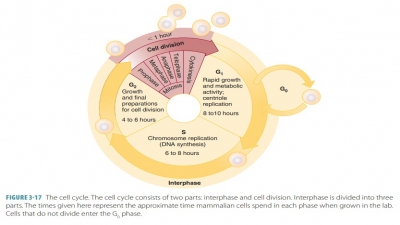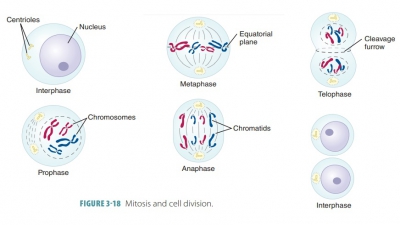Cell Cycle: Differentiation
| Home | | Anatomy and Physiology | | Anatomy and Physiology Health Education (APHE) |Chapter: Anatomy and Physiology for Health Professionals: Levels of Organization : Cells
Differentiation, the process of specialization of a cell, makes each cell unique.
Cell Cycle
The life cycle of each cell is
regulated via stimulation from hormones or growth factors. Disruption of the
cycle can affect the health of the body. Most human cells divide from 40 to 60
times before they die. The life cycle of a cell includes the following steps:
■■ Interphase: The cell obtains
nutrients to grow andduplicate. This is actually the period from cell for
mation to cell division. This step may be betterunderstood as being a metabolic
or growth phase.
■■ Cell division (mitosis): The
nucleus divides.
■■ Cytoplasmic division
(cytokinesis): The cytoplasmdivides.
■■ Differentiation: The cell becomes specialized.
Differentiation
Differentiation, the process of
specialization of a cell, makes each cell unique. New cells must be generated
for growth and tissue repair to occur. Stem
cells are those that can divide
repeatedly without specializing. They can divide either into two identical
daughter cells or so that one daughter cell becomes partially special-ized
(progenitor cells). In the human body, all differ-entiated cell types are
created because of the variance of stem and progenitor cells.
Stem cells in certain organs may
have the ability to heal the body in the future, even though they were
differentiated when the organism was still an embryo or fetus. As the body
continually develops, cells use different parts of complete genetic
instructions so they can become specialized. Genes may be activated in various
types of cells.
Related Topics


